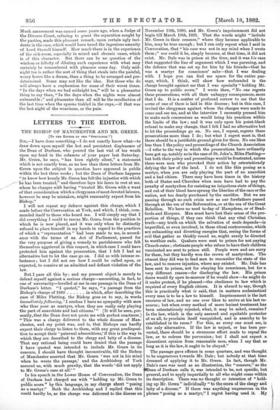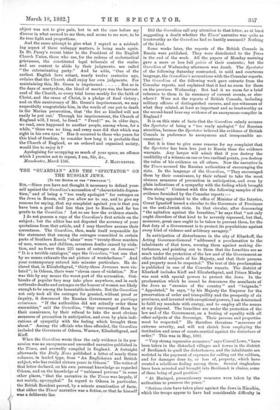LETTERS TO THE EDITOR.
THE BISHOP OF MANCHESTER AND MR. GREEN.
[TO THE EDITOR OF THE "SPECTATOR."] Sra,—I have done something—I do not exactly know what—to draw down upon myself the hot and persistent displeasure of the Dean of Durham, who poured the last vial of his wrath upon my head in the columns of your paper last Saturday. Mr. Green, he says, " has been rightly silent," a statement which is not exactly true, as no less than three letters from Mr. Green upon the subject in question have appeared in public within the last three weeks ; but the Dean of Durham happens "to know how keenly Mr. Green has felt the injustice with which —ins has been treated," and therefore lays his lance in rest at me, whom be charges with having "treated Mr. Green with a want of that consideration which a clergyman of most devoted labours, however he may be mistaken, might reasonably expect from his Bishop."
I will not repeat my defence against this charge, which I made before the Convocation at York, and which, I think, com- mended itself to those who heard me. I will simply say that I did everything I could to rescue Mr. Green from the position in which he is now placed, and it was only when he distinctly refused to place himself in my hands in regard to the practices of which a " representation " had been made to me, in accord- ance with the terms of an Act of Parliament, passed for the very purpose of giving a remedy to parishioners who felt themselves aggrieved in this respect, in which case I could have protected him against the prosecution, that I felt I had no alternative but to let the case go on. I did so with intense re- lactance ; but I did not see how I could be called upon, or expected, to connive at an admitted and defiant violation of the law.
But I pass all this by ; and my present object is merely to defend myself against a serious charge—amounting, in fact, to one of unveracity—levelled at me in one passage in the Dean of Durham's letter. "I quoted," he says, "a passage from the
Bishop's charge of 1880 in which, after describing the case of Miles Platting, the Bishop goes on to say, in words immediately following, I confess I have no sympathy with men who thus pose as martyrs, when they are really only playing the part of anarchists and bad citizens." [It will be seen, pre- sently, that the Dean does not quote me with perfect exactness.] '" This was a charge delivered to the whole diocese of Man- chester, and my point was, and is, that Bishops can hardly expect their clergy to listen to, them, with any great predisposi- tion to accept their paternal admonitions,' if this is the way in which they are described to the clergy and laity of a diocese. That any rational being could have denied that the passage I have quoted was intended to include Mr. Green in its censure, I should have thought inconceivable, till the Bishop of Manchester asserted that Mr. Green was not in his mind when he wrote the passage,' and the Archbishop of York assured us, with much gravity, that the words did not apply to Mr. Green's case at all.' " In his speech in the Lower House of Convocation, the Dean of Durham had charged me with "holding up Mr. Green to public scorn" by this language, in my charge about "posing as a martyr." Both the Archbishop and I replied that this could hardly be, as the charge was delivered to the diocese on November 10th, 1880, and Mr. Green's imprisonment did not begin till March 19th, 1881. That the words might " include Mr. Green in their censure," where they became applicable to him, may be true enough ; but I can only repeat what I said in Convocation, that " his case was not in my mind when I wrote them ;" nor could it be, simply because, at that time, it did not exist. Mr. Dale was in prison at the time, and it was his case that suggested the line of argument which I was pursuing, and the defence that was set up for him by his friends—that he was a martyr for conscience' sake—that I was dealing with. I hope you can find me space for the entire pas- sage, which, I think, will show how unfounded is the charge brought against me that I was specially " holding Mr. Green up to public scorn." I wrote then, "No one regrets these prosecutions, with all their unhappy consequences, more that I do. It is a matter of profound sorrow to me that the scene of one of them is laid in this diocese ; but in this case, I invited the clergyman against whom the charges were made to come and see me, and at the interview I earnestly pressed him to make such concessions as would bring his practices within the limits of the law ; and it was only upon his point-blank refusal to make any change, that I felt I had no alternative but to let the proceedings go on. No one, I repeat, regrets these prosecutions more than I do ; but what I regret most is, that there should be a justifiable ground given for them. No one likes less than I the policy and proceedings of the Church Association —I refer to the way in which the prosecutions have ordinarily been got up, notably so in the case of St. John's, Miles Platting— but both their policy and proceedings would be frustrated, unless there were men who provoked their action by ostentatiously defying the law of the land. I do not like this posing as a martyr, when you are only playing the part of an anarchist and a bad citizen. There may have been times in the history both of States and Churches when men have had to pay the penalty of martyrdom for resisting an iniquitous state of things, and out of their blood have sprung the liberties of the race or the nation, not too dearly purchased by the sacrifice. But we are passing through no such crisis now as our forefathers passed through at the era of the Reformation, or at the era of the Great Rebellion. We have no need to-day of Hampden, or of Brad- fords and Hoopers. Men must have lost their sense of the pro- portion of things, if they can think that any vital Christian truth—any truth on which the salvation of souls depends—is imperilled, or even involved, in these ritual controversies, which are exhausting and diverting energies that, seeing the forms of evil that gather so thickly round us, might surely be directed to worthier ends. Quakers were sent to prison for not paying Church-rates ; obstinate people who refuse to have their children vaccinated are sent to prison still. People were and are sorry for them, but they hardly won the crown of martyrdom. The utmost they did was to lead men to reconsider the state of the law, and to remove injustice, where any existed. Mr. Dale has been sent to prison, not for obeying his conscience, but for a very different reason—for disobeying the law. His prison doors would fly open to-morrow if he would show—he might do it under protest, if he pleased—the obedience to law which is required of every English citizen. It is absurd to say, though this is practically what is said, that in matters ecclesiastical
every man is to be a law to himself. Imprisonment is the last resource of law, and no one ever likes to arrive at his last re- source ; but when every method of more lenient treatment has
been ostentatiously rejected, what, it may be asked, remains P
Is the law, which is the only assured and equitable protector of us all, to proclaim itself vanquished, and is anarchy to be established in its room ? For this, as every one must see, is the only alternative. If the law is unjust, or has been per- verted, there should be a strenuous effort made to repeal the
law, or to redress the perversion; but I shall not expect a dissentient opinion from reasonable men, when I say that as long as it is the law, it ought to be obeyed."
The passage gave offence in some quarters, and was thought to be ungenerous towards Mr. Dale ; but nobody at that time dreamed of applying it to Mr. Green. In fact, though Mr.
Dale's case was used as an illustration, the "censure," as the can of Durham calls it, was intended to be, not specific, but general, and to apply impartially to all who might come within
its description. There was no thought or intention of " hold- ing up Mr. Green" individually "to the scorn of the clergy and laity of a diocese." If there was anything ungenerous in the phrase "posing as a martyr," I regret having used it. My
object was not to give pain, but to set the case before my diocese in what seemed to me then, and seems to me now, to be its true light and proportions.
And the same attempt to give what I regard as a mislead- ing aspect of these unhappy matters, is being made again. In Dr. Pusey's recent letter to the President of the English Church Union, those who use, for the redress of ecclesiastical grievances, the constituted legal tribunals of the realm, and are content to abide by their judgments, are called "the exterminating party." And he adds, "One of the earliest English laws extant, nearly twelve centuries ago, ordains that the Church shall enjoy her own judgments. For maintaining this, Mr. Green is imprisoned But as in the days of martyrdom, the blood of martyrs was the harvest- seed of the Church, so every trial borne meekly for the faith of Christ, and the cause of Christ, is a pledge of final victory ; and on this anniversary of Mr. Green's imprisonment, we may respectfully congratulate him, in the words of one put to death in the Marian persecution, that the fire so kindled will not easily be put out.' Through his imprisonment, the Church of England will, I trust, be freed." " Freed !" as, in older days, we read, once happened to another people, among whom, for a while, " there was no king, and every man did that which was right in his own eyes." Has it occurred to those who yearn for this kind of freedom, to consider how long it is probable that the Church of England, as an ordered and organised society, would live to enjoy it ?
Apologising for occupying so much of your space, an offence which I promise not to repeat, I am, Sir, &c.,



































 Previous page
Previous page